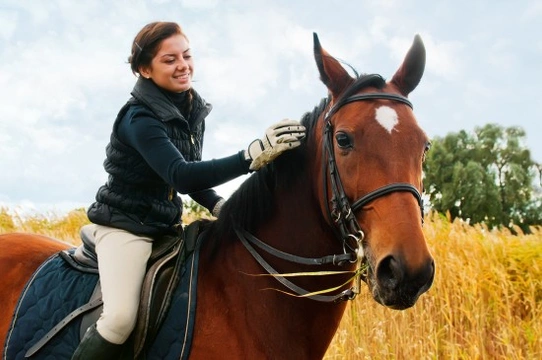
British Horse Society riding instructor grades explained
If you are having riding lessons or are considering having riding lessons, it is important to choose a riding instructor that is appropriate to your skill level and that is able to bring out the very best in you.
The British Horse Society (BHS), the governing body for riding and horsemanship within the UK, is the organisation responsible for overseeing the training and qualifications of riding instructors.
While there is no legal obligation for a riding instructor to hold a professional qualification, nevertheless, the conscientious rider will always choose an instructor who holds or is working up the scale of the qualification levels for riding instructors.
When you book a riding instructor who works on a freelance basis to teach you on your own horse or pony, usually the level of their qualifications are something that they advertise alongside of their services. However, if you book group lessons from a riding school or other establishment, it can be hard to find out at a glance what qualification your actual instructor holds. Most riding schools advertise “BHS qualified instructors,” although the level of qualification of different instructors in any given establishment may range from entry level qualifications up to the highest achievable standard.
As well as finding out exactly what stage or qualification your own instructor holds, it is important to understand exactly what that qualification means, so that you can make an informed decision on whether or not the teaching level of the instructor in question is appropriate for your riding experience.
Read on to learn more about the different BHS riding instructor levels and qualifications.
The preliminary teaching test
The first step on the ladder of teaching qualifications with the BHS is the preliminary teaching test.
Candidates for the preliminary teaching test will have already undertaken and passed three modules in different aspects of the basic principles of horse and pony management, including stable management and ridden skills, and how to communicate these things to novices.
Would-be instructors must be 18 years old or over in order to take the preliminary teaching test.
Upon successful completion of the test, the instructor is then considered to be competent to teach beginners and novices within a supervised environment under the direction of a higher level instructor.
Assistant instructor
The next step up is the role of “assistant instructor,” which again means that the instructor is expected to still be supervised to some degree and undertaking the leaning and progression process to achieve a higher level qualification.
The assistant instructor may work within a riding school or on an independent freelance basis, with a senior instructor available to them for advice and support. A candidate achieves the assistant instructor qualification after completing the three entry level stages leading up to the preliminary teaching test, the preliminary teaching test itself, and submitting a portfolio of coaching experience.
Intermediate teaching test
After the assistant instructor grade comes stage four, when instructors learn to take charge of a riding yard management position in a variety of different situations. Then the intermediate teaching test involves holding a range of health, safety and first aid qualifications, as well as having logged over 500 hours of teaching time in their coaching portfolio. Holders of the intermediate teaching test are qualified to teach beginners and elementary level riders without higher level supervision.
BHS Instructor
The highest teaching level that is usually achieved for all but the most senior instructors in the UK is the BHS instructor or BHSI certification. This requires a significant amount of experience working with horses, riders and a stable management team, and is rigorously examined and assessed. BHSI instructors are often the managers of large riding establishments, and responsible for the training and supervision of a number of other instructors who are working their way through the grading process. BHSI instructors are qualified and experienced in teaching riders of all levels, from beginner to advanced.
Fellow of the BHS
Fellowship of the BHS is the most distinguished top level qualification available to riding instructors, who must be both highly competent and skilled riders and stable managers working full time in an equestrian environment, and able to serve as an ambassador for the BHS and advocate for the organisation. It is a very highly regarded position, recognised internationally as one of the highest levels of horsemanship and teaching ability in the world.
Fellows of the BHS may either apply as a general fellow, or specialise in a specific discipline such as dressage, showjumping or eventing.
Other qualifications
All of the qualifications listed above are linear, and progress upwards through a highly structured system of training and examination.
However, there are a couple of incidental instructor qualifications that are suited to instructors or ride leaders involved with trekking and casual riding rather than progressive teaching systems for advancement.
The equestrian tourist ride leader and the assistant ride leader qualification certifies riders who are safe, skilled and competent at leading treks and hacks for novice riders, and takes into account the unique challenges that riding out of an enclosed arena can produce.
These qualifications are usually held by instructors and experienced riders and stable managers within trekking centres and riding holiday centres, and do not form part of the linear progression path to the usual BHS rising instructor qualifications.



